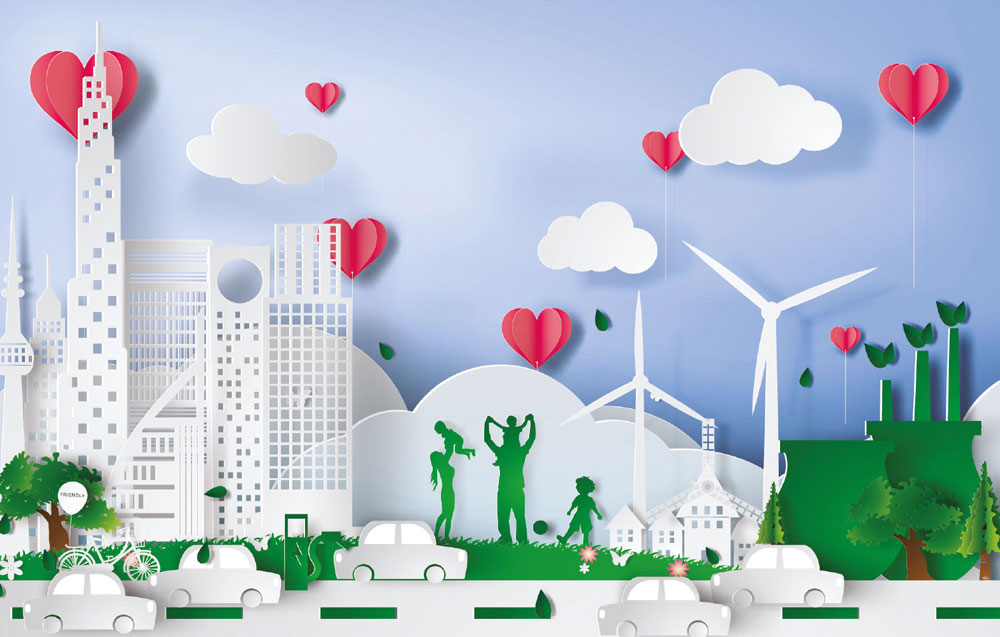SUSTAINABILITY TRENDS
FORCE FOR POSITIVE CHANGE
Kiran Dhanapala highlights key sustainability trends for the year ahead
Commit. Collaborate. Communicate. The three Cs are an apt mantra, according to sustainability guru Joel Makower. A mantra helps focus minds by reducing mental noise. ‘Man’ refers to the mind and ‘tra’ to going beyond it. So ‘mantra’ is about sound or vibrations and enabling positive change.
Sustainability is a force for positive change. Creating our own mantra – harmonising with a sustainability strategy and plan – will help focus and anchor efforts in the new year.
A sustainability strategy and plan is the main advantage for a company starting out on its sustainability journey. It demonstrates commitment and is a road map to a vision of the most sustainable company in 20 years’ time. Commitment is powerful when made public. Corporate good practice implies publishing key sustainability goals and targets, for greater transparency and accountability.
We may have different sustainability priorities – determined by our respective business cases – but need a basis on which to commit, collaborate and communicate. Our sustainability plan and mantra must resonate with all we do and aim for in the years ahead.
Commitment requires assigning dedicated professionals to focus on business strategy, change management and the execution of sustainability initiatives embedded in the business.
The State of the Sustainability Profession 2018 survey notes the growing professionalisation of the role of sustainability in global companies. Budgetary commitments are demonstrably higher with 81 percent of large corporations holding firm or increasing budgets. Teams are larger – 87 percent of large corporate teams staying the same (38%) or increasing (41%) in size in the past two years. This has little to do with the relevant sector.
Several global issues merit attention in sustainability efforts as we move ahead in implementing the three Cs.
Air pollution is a major environmental threat that often disproportionately affects those in developing countries who rely on fossil fuels. The WHO World Health Statistics 2018 report notes that globally, 93 percent of children live in air polluted environments (above WHO guidelines). It highlights the resulting health costs for children who are particularly susceptible and acknowledges that public policy is crucial. Regional and global cooperation is needed to reduce children’s exposure.
Sri Lanka’s level of ambient air pollution is high. It is above US Environmental Protection Agency and WHO standards for particulates. Comprehensive data is limited and inaccessible. Ambient air pollution monitoring requires strengthening at stations in Colombo and regional urban centres. Companies can play a role in supporting air pollution monitoring infrastructure and creating public disclosure of these levels for the greater good as part of sustainability initiatives.
Realising the severity of climate change has led to greater impetus following the Intergovernmental Panel on Climate Change (IPCC) 2018 report, which forecasts an escalation of worsening effects in 15 years. It says delayed actions to reduce greenhouse gases involves escalating costs, a lock in of carbon emitted infrastructure, stranded assets (e.g. coal) and reduced flexibility with options to respond in the medium to long terms.
Businesses must institute capacity to begin climate risk assessments and build resilience to climate risks in their operations. Building resilience will take time, money and expertise. There’s more demand for financial services company disclosures especially on the recommendation of the Task Force on Climate-related Financial Disclosures.
The plastic backlash has gained momentum with the New Plastics Economy Global Commitment, which reinforced other agreements such as the G7 Ocean Plastics Charter, EU Strategy for Plastics in a Circular Economy, Commonwealth Blue Charter and UN Community of Ocean Action.
Ratification by over 275 brands, retailers, recyclers, NGOs and governments on closing the loop on plastic pollution is a first. The group accounts for around a fifth of global plastic packaging and includes the full value chain for plastics. All plastic packaging will be designed as recyclable or compostable, or both, after several reuse cycles.
The Sustainable Development Goals (SDGs) are increasingly used and personalising this to a company is the norm as highlighted by the State of Sustainable Business 2018 survey. It notes an increased use of SDGs in corporate target setting (71% in 2018 compared to 54% in 2017).
Sri Lankan companies are demonstrating increased referencing of SDGs as reflected in recent sustainability award applications. There’s room to strengthen this for a speedy retrospective retrofit through which we assess where to make a strategic impact on Sri Lanka’s weaker SDG areas.
Globally, the highest four SDG mentions are for climate action, decent work and economic growth, responsible consumption and production, and gender equality.







Not with a bang but with a forceful vibration! Yes, sometimes the world needs a forceful change to ‘feel it, know it and work towards it’ (i.e. 3Cs in action) and not just optimism and hardwork to positive change. The 3Cs is the common thread, the glue that binds the resonating mantra and the sustainability plan.
First, it’s essential to get the logic right. Get an understanding of the aspects – what and why they matter the most – before going into the usual strategy formation that we all know about and hear of. The vibrations mentioned at the onset has brought and is further bringing more noteworthy issues and anticipations into the limelight where the world and its people feel its gravity. This way, concerns will not be addressed at the table level alone but at ground level as well, where commitments and collaboration need to be closely-knit and further enforced.
This aligns with the potential of creating public disclosure as an integral part of sustainability initiatives with regards to air pollution in Sri Lanka. The 3Cs – commit, collaborate and communicate – may have played its cards well to fuel off the plastic backlash. It is now reasonable to fathom the plastic backlash gaining momentum which made the way in reinforcing other agreements on plastic pollution – a major portion attributable to the forces of vibrations that helped it sustain.